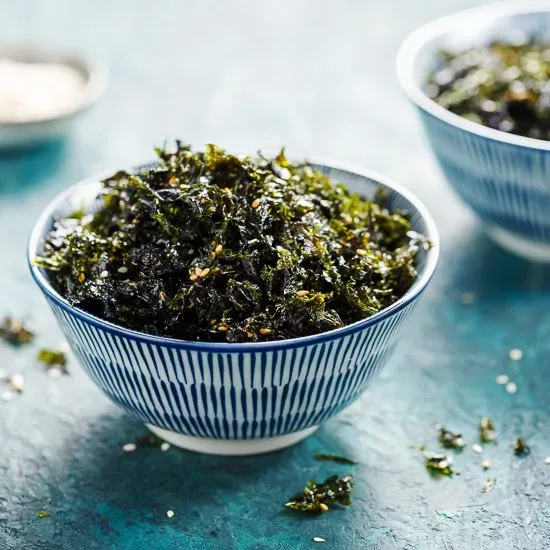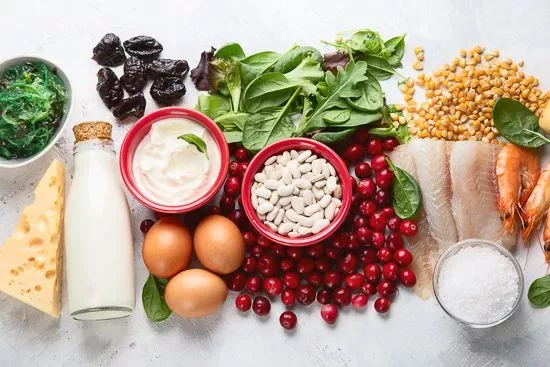
Iodine: Are You Deficient in This Trace Mineral?
If you restrict dairy, seafood, and/or eggs, you likely are not getting enough iodine and may even be deficient. Sufficient iodine intake is especially important for women of childbearing age.
by Selva Wohlgemuth
Registered Dietitian Nutritionist and owner of Happy Belly Nutrition
Iodine is an essential trace mineral needed for optimal thyroid function. It is required to make thyroid hormones T3 and T4, which regulate growth, neurological development, metabolism, and digestive function.
Insufficient iodine intake can lead to a condition called hypothyroidism, weight gain, poor cognition, and constipation. Iodine also plays a role in estrogen metabolism and has been found to have protective effects against breast cancer and reduces cyst formation and breast tenderness.
Mild iodine deficiency is very common amongst women and individuals with dietary restrictions. Data from the US NHANES indicate that 37% of women between 18-44 years old are iodine deficient and another study found that 50% of pregnant and breastfeeding mothers were not eating enough iodine.
Eat More Iodine
Iodine is typically found in soil and seawater, and in animals who are fed iodine-rich foods. However, there are many regions of the USA that have poor iodine content, including the Pacific Northwest. Therefore, vegetables and fruit grown in the PNW, as well as grazing animals and their milks, have lower iodine content than elsewhere in the nation.
Programs have been implemented to iodize table salt in order to address this concern. However, iodine is very unstable and diminishes over time, with losses of 10-100% over a year depending on the packaging material, temperature, and humidity of the stored salt. Therefore, iodized salt is not the most reliable source of iodine. Furthermore, with the increase in processed food consumption (which does not contain iodized salt), Americans are using less iodized salt in cooking.
Dietary restrictions can further contribute to poor iodine intake. Foods rich in iodine include seafood, seaweed, and meat and dairy products from animals grazed on iodine-rich soils. If intake of the aforementioned foods is inadequate, and salt intake is reduced, iodine deficiency can occur. Vegans and vegetarians, as well as anyone on a dairy-free, or seafood- and seaweed-free diet is at an increased risk. Moreover, cruciferous vegetables and soy are considered goitrogens and can interfere with iodine. High intakes of these foods, along with a diet low in iodine, can contribute to iodine deficiency.

Iodine needs fluctuate throughout our lives, but most adults need 150mcg per day to prevent deficiency. However, needs greatly increase for pregnant or nursing mothers, with an increase to 220mcg to 290mcg per day in pregnant and breastfeeding women. This is of great concern because the fetus and infant are entirely reliant on their mother’s intake to produce thyroid hormones. Inadequate iodine intake can also lead to neurological problems in children. Therefore, ensuring adequate iodine intake prior to, during, and after pregnancy is critical. But be cautious — too much iodine can also be of concern, leading to iodine-induced hyperthyroidism or hypothyroidism. It is important to work with a dietitian for individual guidance.
Iodine-rich Meals and Snacks

- Use Redmond’s Real Sea Salt in cooking for a natural source of iodine-rich sea salt.
- Snack on organic seaweed snacks for an iodine boost.
- Make a wrap with a nori sheet.
- Sprinkle dulse granules on meals for a smoky flavor.
- Enjoy quality wild-caught seafood 2-3x per week.
- Add a kelp frond to soup stocks or bone broth while cooking.
- Enjoy a poke bowl that includes seaweed and quality seafood.
- If using iodized sea salt, buy a new container every month, for optimal freshness.
- If you tolerate dairy, enjoy organic grass-fed milks or yogurts.
